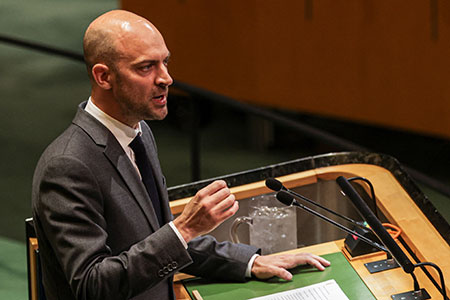
In a significant diplomatic development, France is spearheading a coalition of 15 Western nations poised to formally recognize Palestinian statehood this coming September. A joint statement released by the French Ministry of Foreign Affairs outlined the collective commitment, which includes major U.S. allies such as Canada and Australia, alongside European partners like Spain, Ireland, Finland, and Norway. The group is actively calling on other United Nations members who have not yet recognized Palestine to follow their lead.
The signatories were careful to frame the move not as an anti-Israel gesture, opening their statement with a condemnation of the ‘heinous and anti-Semitic terrorist attack’ by Hamas on October 7, 2023. However, the initiative is likely to be viewed critically by Israeli authorities due to unresolved diplomatic nuances. For instance, Spain’s previous recognition specified support for a Palestinian state along 1967 borders with East Jerusalem as its capital—a direct contradiction to Israeli law, which designates a ‘united and indivisible’ Jerusalem as its own capital.
While the decision is not entirely unprecedented—as Spain, Ireland, and Norway had already recognized Palestine in May of the previous year—the coordinated action by such a large group of Western countries marks a pivotal moment. This adds substantial weight to the more than 140 UN member states that have long recognized Palestine, signaling a potential turning point in the long-stalled two-state solution framework amid growing international pressure.
The reaction from Washington remains a critical, yet uncertain, factor. The U.S. administration has indicated it is not currently taking a position on Palestinian independence, prioritizing an end to the ongoing conflict, the release of hostages held by Hamas, and alleviating the severe humanitarian crisis in the Gaza Strip. The future American stance on recognition will likely be heavily influenced by the findings of U.S. Special Envoy for the Middle East, Steve Witcoff, following his upcoming visit to assess the situation on the ground.
International affairs analyst Elena Suponina suggests the announcement serves as a powerful signal to the Israeli government. She notes that beyond any domestic political motivations for leaders like French President Emmanuel Macron, the initiative illustrates a palpable shift in global sentiment. The initial wave of international sympathy for Israel following the October 7th attack is now increasingly being replaced by concern for the Palestinians, a changing dynamic that Prime Minister Benjamin Netanyahu’s government will be forced to confront.
